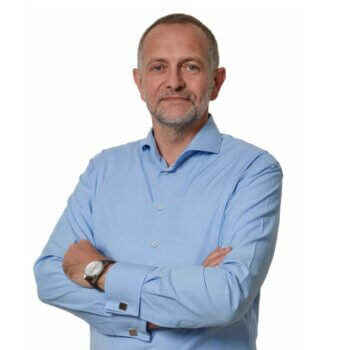Bernard Zimmermann is a software developer and designer who was one of the first to see the potential of computerising retail and so founded in 1983 POS Solutions with the purpose of helping retailers. Today POS Solutions with offices Australia-wide is one of the largest and leading providers of point of sale and e-commerce software to Australian retailers which has been and is still used in thousands of stores.
He is also a highly regarded retail software blogger whose blog “POS Software” is widely read.
He consults to many large organisations such as News Corporation and the Australian Taxation Office.
Most importantly, Bernard provides tools and advice to help make retail thrive through his writings, speeches and workshops. He is dedicated to helping grow the businesses’ capabilities and connections and to get each and every client to that next level of success, no matter where they are in the process right now.
Bernard lives in Melbourne, Australia with his wife, a French and German teacher and real estate developer, their daughter and a dog. In his spare time, which he rarely gets, he enjoys reading about history, politics and science, as well as play chess.
In your own words what do you do?
I consider that I am trying to help small, medium and independent retailers use technology to improve and grow their own businesses.
What led you to your current business?
After a lot of research, I knew retail very well having been born and raised in a small family retail shop and then having worked in many retail stores. Once I graduated from engineering, I became a software developer and consultant with Zac Varga, who later became my business partner. What we noticed was that there were few decent softwares for retail shops in those days. What we saw were generally modified accounting programs, which in practice tended to be unusable for retail. So we wrote a list of requirements that retail needed. Then in one month, I wrote our first point of sale system. It says much about the existing systems back then that this quickly written POS software was considered better than what was out there. This package became one of the most successful point of sale systems in Australia.
Could you walk us through your process of developing your business?
What we were aiming for was long-term growth. We were first of all two technical people, who were willing to work our butts off, and we knew that although we could not compete with the marketing budget of our competitors, we knew we could technically produce something remarkable and outproduce them in quality. If we had a few sites, word of mouth would spread our products. This became our plan.
It worked. People started to hear of us; they came to see our system, our sales figures increased dramatically as our software increased the productivity of our clients’ businesses. We then spent nearly all our profits on technology and actively chased emerging technology and followed industry trends and used them to improve our product and make it more relevant. It cost us practically everything, but we knew we had to have the best point of sale system.
Did you encounter any particular difficulties in the beginning?
I had a dream, yet when I tried to get going, like many startups, at first it was all vapour but it still was my dream. Until I became firmly established, there was always a doubt. With pos software, this is a critical challenge or barrier to entry as people tend to buy major point of sale software on lease, which is generally five to seven years. If they have doubts about you being there in this period, they will not buy your product. Our competitors, jealous of our success and knowing that they could not compete with us technically often spread half-truths and lied about us. Although we were never outclassed technologically, we certainly had much to learn about the commercial realities.
What is your long term plan?
I love what I do; I want to keep doing it, as long as I can. I love being productive and useful. I love helping people get the most out of their business. I love to learn about technology. Basically I do not work, but I get paid to do what I like doing.
Could you share with us some industry insights?
There is a saying ‘count the pennies and the pounds’ and the business will look after itself. This is so true. Every business has to count every penny. Margins are rarely high today and it is in the pennies where the profit is but remember although the lack of profit may kill you in the long run, the lack of cashflow will kill you immediately. Cashflow must be monitored at all times as lack of liquid capital is the major cause of business failure. No matter if the creditor is big or small, every creditor must be watched. The biggest creditors including goverment departments can be the slowestpayers. You must always ask yourself: ‘Can I afford this contract?’ I have seen many businesses go under with no cash yet on paper they had good profits.
Technology, the politics of a country and society change dramatically today but industry changes even faster. Do not count on what you are used to be continuing. It will not. Recently, I have seen some shops that were in existence for years, suddenly devastated when a rail development closed most of the roads servicing that shopping centre. A fish shop lost much of its traffic when the supermarket decided to put a line of fish products.
What are some important lessons you’ve learnt about entrepreneurship?
Planning, just a little, can give you direction and purpose.
The first point is to develop a mission statement. What I see far too often is people who do not make one or make one like for a Uni assignment and eventually disregard it. Soon they forget why they went into business or their goals altogether. They run their business with no purpose.
Before you do anything create a mission statement for your company and ensure you also list the benefit to your clients as one of your foremost company goals.
Before we did anything, we looked at the current state of the market for our product. We immediately created a short mission statement for our software and what we considered our point of difference was. After that we had our sales pitch that we could explain to any potential client or supplier in thirty seconds for what our company stood.
Any tips for achieving success?
Get used to failure, refusal, negativity and mockery.
As you proceed with your business, you will often face doubts and criticisms from competitors, lawyers, people in the market, employees and even friends and relatives. Some will be true as we all make stupid mistakes and we sometimes trust people who let us down; we take chances that fail, so we need to accept that it is a learning process like everyday life itself. People are going to say NO. For every contract you get, there are probably five that you will miss out on. The knockers are everywhere. This is the way business is.
Develop a thick skin. What I do, if it gets too much, is go and see some clients that are happy with our services and products. Talk to them. After all, they are what you are here for. Look how far you have come, pick yourself up, consider it a learning experience and move on.
Connect
Website: www.possolutions.com.au
Linkedin: https://au.linkedin.com/in/bernard-zimmermann-25407918
Facebook: https://www.facebook.com/POSSOLUTIONSAU/































